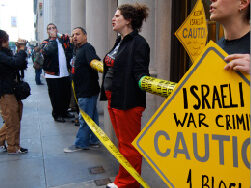It is a Palestinian Call: A response to Finkelstein and Beinart on BDS
by Noah Lepawsky Emily Katz Kishawi and Mich Levy on March 26, 2012
In response to the recent debate regarding the Palestinian civil society call for Boycott, Divestment and Sanctions, we offer a view from a Jewish anti-Zionist perspective. We welcome debate as a part of the growth and success of an international movement deploying BDS against Israeli occupation, apartheid and colonization.
A claim has been made byDr. Norman Finkelstein (known for his condemnation of Israel’s use of the Holocaust to justify and perpetuate Israeli atrocities both historicand current) that the Boycott, Divestment and Sanctions (BDS) campaign will not win over public opinion towards support of Palestinian rights because its goals imply destruction of Israel. This claim contradicts his own eloquent evocation of humanitarian and human rights law – which is precisely the basis for the Palestinian call for BDS.
South Africa was not ‘destroyed’ or ‘dismantled’ when apartheid ended; rather, the illegal nature of the state was transformed. BDS does not call for the ‘destruction of Israel’; it calls for the enforcement of international law.
Meanwhile, a call has been made toZionist American Jews to implement a “Zionist BDS” that isolates and condemns Israeli expansion in the Occupied Palestinian Territories in order to “save Israel.” The Zionist “left” argues that Israel is a “flawed but genuine democracy” with an “ethnically-based non-democracy” beyond the green line (the land occupied in 1967), and that the latter threatens the existence of the former.
This is the fundamental contradiction of Zionism: If the occupied territories are not a democracy due to “ethnically-based” oppression, how can a Jewish state – defined by its sectarian identity – possibly bedemocratic? Too many defenses of unjust Israeli policy rest on a refusal to recognize that a state organized on privileging one sectarianidentity is, by definition, anti-democratic.
We all share a responsibility to reject unjust laws and practices – including discrimination, exclusion and ethnic cleansing – and to insistthat the guidelines by which we live are those which maintain the rights and dignity of all people. In the United States, many believed that an economy built on slavery was compatible with democracy; that wasn’t true. We reject the Zionist assertion that a Jewish settler-colonial state can be democratic.
The international call for boycott, divestment and sanctions to end the occupation challenges individuals who profess to respect principles of human rights and dignity to question and rescind their support for anapartheid State of Israel. Supporting the Palestinian call for BDS of Israel is one way to stand on the right side of history.
Many divergent visions of the future of Palestine exist. We can agreeand disagree. Nevertheless, we welcome and encourage all initiatives, particularly from among Jews, that genuinely seek to challenge existing oppression in Palestine. We remind all participants in these debates that it is not the role of people in the US to determine the future of another people, and call for respect for the fundamental Palestinian demand for self-determination.
History has taught us that no oppression can be challenged effectively except through the participation and active leadership of those who are principally affected. We are therefore particularly alarmed by suggested campaigns that seem to seek to remove Palestinian demands from the center of the struggle against the occupation. Such campaigns, even if they outwardly challenge the occupation, will, at best, result in a less explicit apartheid and a less recognized occupation. A just resolution needs to include, at minimum, the three stated rights of the Palestinian civil society call: 1) Ending the occupation and colonization of all Arab lands and dismantling the apartheid wall; 2)Recognizing the fundamental rights of the Arab-Palestinian citizens of Israel to full equality; and 3) Respecting,protecting and promoting the rights of Palestinian refugees to return to their homes and properties as stipulated in UN resolution 194.
About Noah Lepawsky Emily Katz Kishawi and Mich Levy
Noah Lepawsky, Emily Katz Kishawi and Mich Levy are members of the International Jewish Anti-Zionist Network which supports the full BDS call to action.The International Jewish Anti-Zionist Network is an international network of Jews who are committed to struggles for human emancipation, of which the liberation of the Palestinian people and land is an indispensable part. Our commitment is to the dismantling of Israeli apartheid, the return of Palestinian refugees, and the ending of the Israeli colonization of historic Palestine.More information can be found at ijsn.net and bdsmovement.net.



